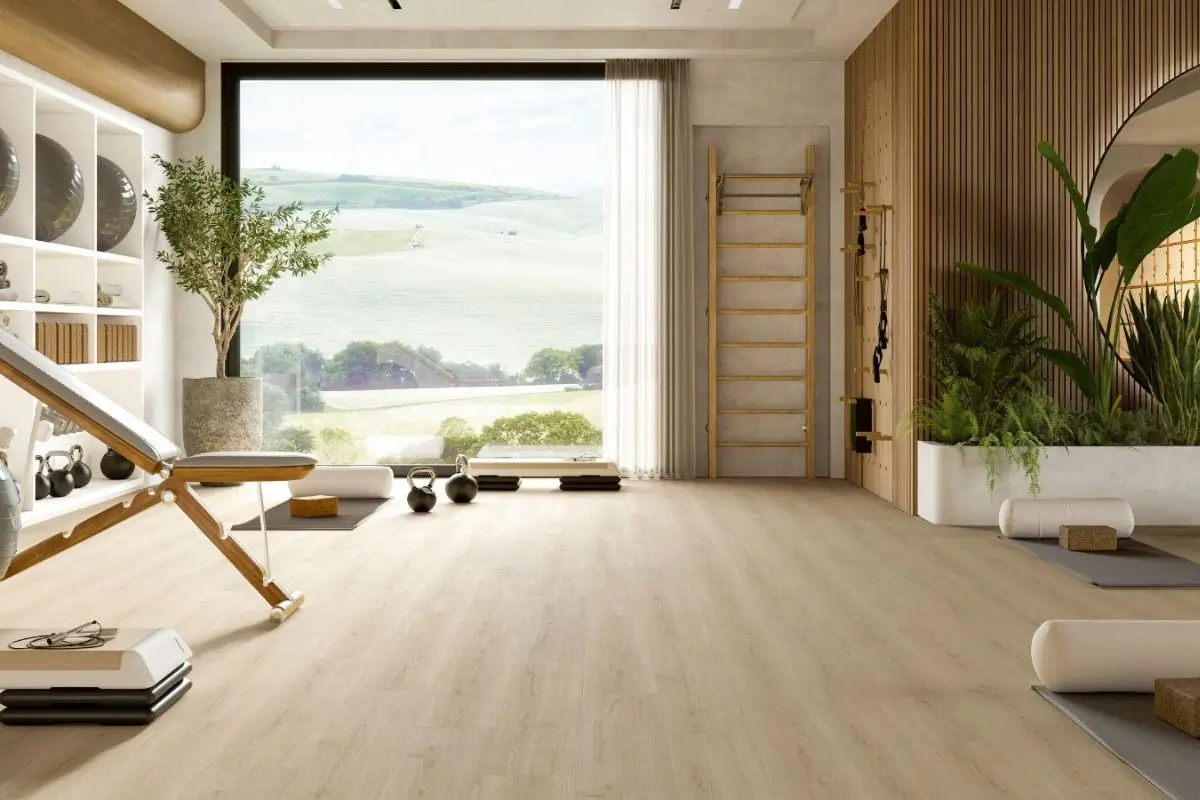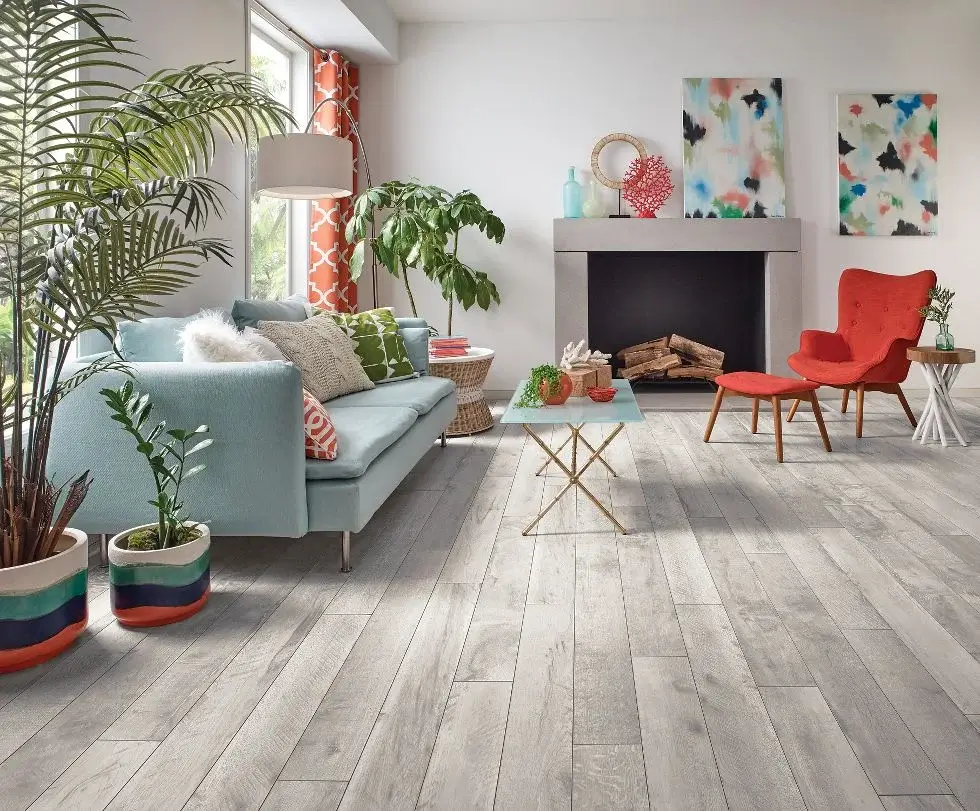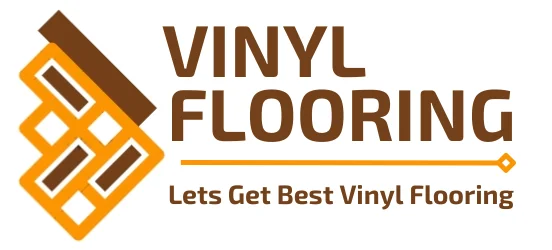When it comes to choosing the right flooring for your home, safety, durability, and design matter. Vinyl flooring has become a popular choice for many homeowners because of its versatility and affordability. But is it truly safe for your living space, particularly if you have children or pets? In this blog, we’ll explore the safety of vinyl flooring by analyzing its pros, cons, and overall impact on health and the environment. By the end, you’ll have a clearer understanding of whether vinyl flooring is the right choice for your home.
Understanding Vinyl Flooring: What Makes It Unique?
Vinyl flooring is a synthetic flooring material made primarily from polyvinyl chloride (PVC). It is designed to imitate the look of natural materials like wood, stone, or tile, while offering a more affordable and low-maintenance option. Vinyl comes in several forms, such as sheets, planks, and tiles, each offering different installation methods and aesthetic possibilities. One of the main benefits of vinyl is its water-resistant properties, making it a good option for high-moisture areas like kitchens and bathrooms. However, the synthetic nature of vinyl flooring raises concerns about its chemical makeup and its potential effects on indoor air quality. Understanding what vinyl flooring is made of is important when assessing its safety and suitability for your home.
Is Vinyl Flooring Safe? Key Safety Considerations
When considering the safety of vinyl flooring, it’s important to address its potential impact on indoor air quality. Traditional vinyl flooring can emit volatile organic compounds (VOCs), chemicals that can affect the air you breathe. Long-term exposure to high levels of VOCs may lead to health concerns, such as headaches, dizziness, or respiratory issues. Fortunately, newer vinyl flooring products are made with low-VOC and phthalate-free materials, reducing these risks. Another key safety feature of vinyl flooring is its non-porous surface, which helps prevent the growth of mold and bacteria, making it a good choice for areas prone to moisture. Additionally, vinyl flooring is hypoallergenic, meaning it doesn’t trap dust or allergens like carpets, contributing to better indoor air quality overall. To ensure the safety of your home, always opt for certified vinyl flooring with labels like FloorScore or GreenGuard, which guarantee low chemical emissions.
Why Homeowners Love Vinyl Flooring: The Pros
Vinyl flooring is popular for a reason: it offers a wealth of benefits that make it an attractive choice for homeowners. Here are the top reasons people love vinyl flooring:
- Budget-Friendly Beauty: Vinyl offers the look of expensive materials like wood or stone without the hefty price tag.
- Durability for Busy Homes: Resistant to scratches, stains, and moisture, vinyl flooring can withstand high foot traffic and is ideal for families with children or pets.
- Design Variety: With endless design options, vinyl can replicate the look of hardwood, stone, tile, or even luxury materials like marble, making it highly versatile for any room.
- Waterproof Wonders: Its waterproof capabilities make vinyl an excellent option for kitchens, bathrooms, and basements—areas where other types of flooring might fail.
- Low-Maintenance Marvel: Unlike hardwood or carpet, vinyl requires minimal upkeep, typically just sweeping or vacuuming and occasional mopping to keep it looking fresh.
These features make vinyl flooring an appealing choice for homeowners who want style and performance at an affordable price.
The Other Side: Potential Cons of Vinyl Flooring
While vinyl flooring has plenty of benefits, it’s not without its drawbacks. It’s important to consider both the pros and cons before making a decision:
- Chemical Emissions: Traditional vinyl flooring can release harmful chemicals into the air, particularly if it’s not low-VOC or phthalate-free. These emissions can contribute to poor indoor air quality.
- Environmental Impact: Vinyl is non-biodegradable, which means it doesn’t break down in the environment. Additionally, the production of vinyl flooring involves PVC, a plastic material that can release toxins during its creation and disposal.
- Sun Damage: Vinyl can fade or discolor when exposed to direct sunlight over time. This may affect the flooring’s appearance, especially in rooms with lots of natural light.
- Perceived Quality: While vinyl is durable and stylish, it might not offer the same luxury feel as real hardwood, stone, or marble. It can also decrease your home’s resale value compared to more premium flooring materials.
- Prone to Damage: While generally durable, vinyl is susceptible to scratches and dents from heavy furniture, sharp objects, or heavy foot traffic. Some types of vinyl can be difficult to repair once damaged.
Considering these cons will help you make a more informed decision based on your lifestyle and needs.
Is Vinyl Flooring Eco-Friendly? The Green Perspective
Vinyl flooring is often criticized for its environmental impact. The production of vinyl flooring involves PVC, a material that is energy-intensive and produces harmful byproducts during manufacturing. Additionally, vinyl flooring is not biodegradable and can end up in landfills, contributing to waste. However, the good news is that there are more eco-friendly vinyl flooring options available. Many manufacturers are now using recycled materials to produce vinyl flooring, which helps reduce the environmental footprint. Moreover, certifications like GreenGuard and FloorScore indicate that the product has met strict standards for low chemical emissions, making it safer for both people and the planet. While vinyl flooring may not be the most eco-friendly option, its environmental impact can be reduced by choosing more sustainable and certified products.
Considering Alternatives: What Else Is Out There?
If vinyl flooring doesn’t align with your priorities for safety or sustainability, consider these alternative flooring options:
- Laminate Flooring: Made of composite wood materials, laminate can provide a similar look to vinyl but with fewer environmental concerns.
- Hardwood Flooring: A timeless option that adds value to your home, though it requires more maintenance and a higher price point.
- Bamboo or Cork Flooring: Both are renewable, sustainable, and biodegradable materials that make eco-friendly flooring choices.
- Ceramic or Porcelain Tile: Highly durable, water-resistant, and versatile, ceramic or porcelain tile is a great alternative for high-moisture areas.
- Natural Stone Flooring: Materials like slate, marble, or granite offer a luxurious, durable alternative, but they come at a higher cost and may require more maintenance.
Each option has its benefits, so consider factors like cost, environmental impact, and maintenance requirements when choosing the best flooring for your home.
Making a Safe Choice: Tips for Choosing the Right Vinyl Flooring
To ensure you select the safest vinyl flooring for your home, here are some tips:
- Look for Certifications: Opt for vinyl flooring with certifications like FloorScore or GreenGuard to ensure it meets strict safety and low-emission standards.
- Choose Low-VOC Options: To reduce the risk of indoor air pollution, select low-VOC or phthalate-free vinyl flooring products.
- Prioritize Durability: Choose high-quality vinyl designed for durability, especially if it will be installed in high-traffic areas or rooms with moisture.
- Consult Reputable Brands: Research flooring brands known for their commitment to quality and safety. This can help you avoid potential pitfalls.
- Consider Professional Installation: Professional installation ensures that the flooring is laid properly and performs as expected, reducing the likelihood of damage or poor air quality.
By following these guidelines, you can ensure that your vinyl flooring choice is safe and reliable for your home.
Conclusion
Vinyl flooring offers a compelling combination of affordability, style, and durability, making it a popular choice for many homeowners. While concerns about chemical emissions and environmental impact are valid, choosing low-VOC, certified vinyl products can help mitigate these risks. For families with children or pets, vinyl’s hypoallergenic, moisture-resistant properties make it a practical and safe option. Whether vinyl flooring is right for your home depends on your specific needs, budget, and long-term goals. By weighing the pros and cons, considering alternatives, and selecting certified products, you can make a well-informed decision that best suits your home and lifestyle.








